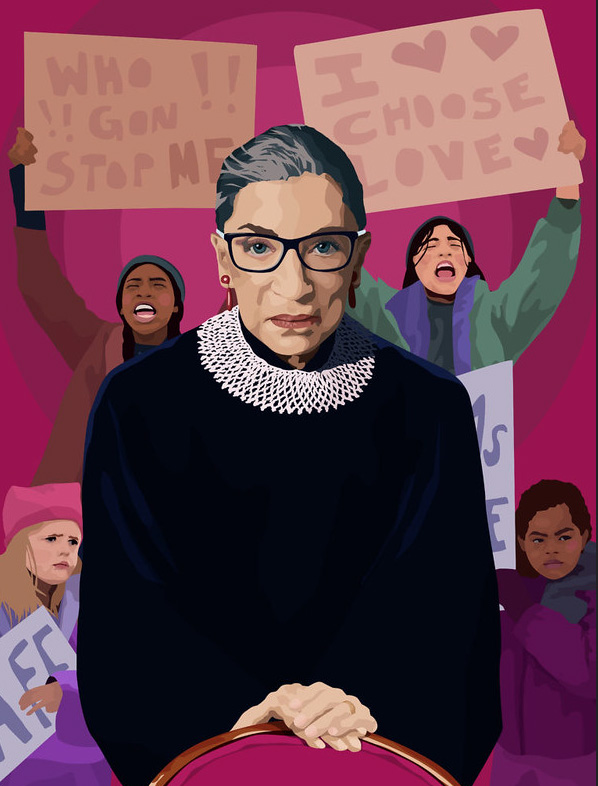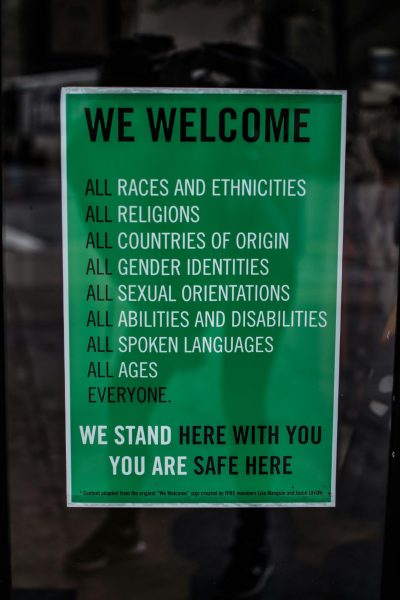Notorious RBG & Her Legacy
On Friday, September 18th, 2020, Supreme Court Justice Ruth Bader Ginsburg died from complications of metastatic pancreatic cancer. Ginsburg was a pioneer for gender equality, inspiring people across the world by her resilience and ceaseless fight for justice.
Eight months ago, during Close Up, I stood on the large marble steps of the Supreme Court, freezing from head to toe, at five in the morning. As I looked up at the huge white columns, I saw where I wished to be in thirty years. Watching Espinoza v. Montana Department of Revenue argued in person was truly life-changing and I could not help but cry quietly as RBG asked her first question.
“Women belong in all places where decisions are being made. It shouldn’t be that women are the exception.”
People always find it odd when I explain my deep connection to Ruth Bader Ginsburg. I am not the only person to choose her as my hero and I surely will not be the last, but Justice Ginsburg has held a place in my heart ever since I heard her story. Growing up around my mom, a fierce reproductive rights advocate, RBG was always a queen of our household. As I began to grow more interested in politics, Ruth Bader Ginsburg became my motivation to persist through challenges.
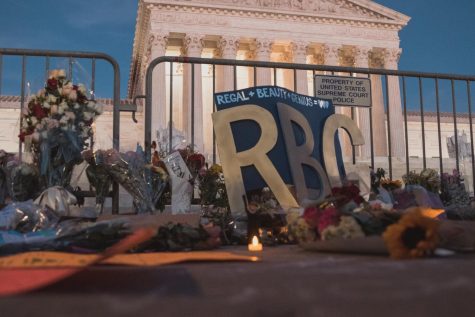
Ruth Bader Ginsburg attended Harvard Law School in 1956. She was one of nine women in her class, accompanied by five hundred men. Ginsburg’s first daughter was born fourteen months before she enrolled. While at Harvard, her husband Martin Ginsburg was diagnosed with testicular cancer. Ginsburg assisted her husband in his classes, while remaining at the top of her own class. She then transferred to Columbia Law School in 1956 when Martin got a job in New York, and finished tied as the first in her class.
“When I’m sometimes asked ‘When will there be enough (women on the Supreme Court)?’ and my answer is: ‘When there are nine.’ People are shocked. But there’d been nine men, and nobody’s ever raised a question about that.”
After graduating, Ruth Bader Ginsburg became the first female professor at Columbia to earn tenure. She directed the Women’s Rights Project at the American Civil Liberties Union in the 1970s. During this time, Ginsburg created a key strategy in fighting for gender equality: representing a male plaintiff to challenge gender-discriminatory legislation. She argued and won five landmark Supreme Court Cases, significantly reforming the pervasive gender inequality embodied in the nation’s laws.
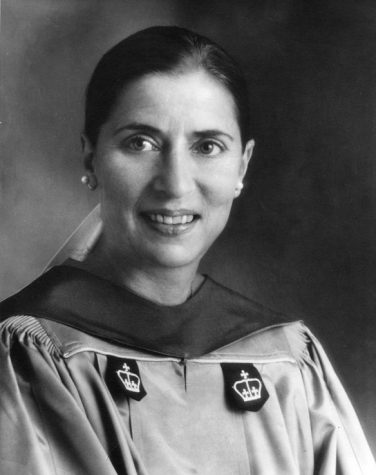
In 1980 Ruth Bader Ginsburg was appointed to the United States Court of Appeals for the District of Columbia Circuit by President Jimmy Carter, and in 1993 was appointed to the Supreme Court of the United States by President Bill Clinton. Ginsburg was the second female and first Jewish female justice on the court. She took part in multiple landmark decisions. In 1996, Ginsburg wrote the majority opinion for the United States v. Virginia, which ruled that the Virginia Military Institute could not deny admission to qualified women on behalf of gender. She also very famously dissented in Ledbetter v. Goodyear. In this case, a female worker was paid significantly less than her male counterparts, but her suit against the Tire & Rubber Co. under Title VII of the Civil Rights Act, was denied relief by the Court of Appeals due to a statute of limitations issue. In defiance of court tradition, Justice Ginsburg disagreed with the majority decision of the court in favor of Tire & Rubber Co. Ginsburg read a large dissent from the bench, and two years later helped President Obama pass the Lilly Ledbetter Fair Pay Act of 2009. This act amended Title VII of the Civil Rights Act, reforming loopholes used to avoid equal pay. Justice Ruth Bader Ginsburg also fought avidly for the reproductive rights of women and strongly supported gay marriage. Along with being one of the most fervent questioners on the bench, until 2018 Justice Ginsburg did not miss one oral argument. This included when going through chemotherapy and the day after her husband passed away.
“Fight for the things that you care about. But do it in a way that will lead others to join you.”
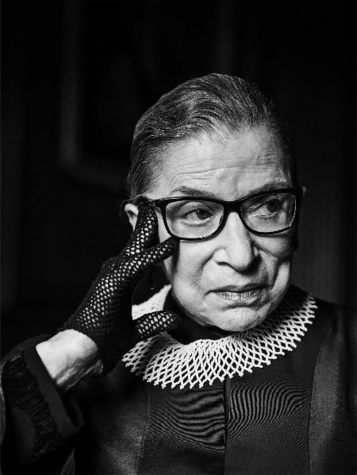
Ruth Bader Ginsburg was unquestionably one of the biggest change-makers of today. She showed extreme resilience in her fight for gender equality and is an example for every person who wants to reform injustice in the world. Shortly before Ginsburg died, she told her granddaughter that her most “fervent wish” was that she “will not be replaced until a new president is installed.” In supporting this wish and carrying on her legacy, every person should call their senators’ offices and demand that her replacement not be appointed until after the 2020 election.
Justice Ruth Bader Ginsburg will not be forgotten. Her legacy will reside in every battle left unfinished.
“Dissents speak to a future age. It’s not simply to say, ‘My colleagues are wrong and I would do it this way.’ But the greatest dissents do become court opinions and gradually over time their views become the dominant view. So that’s the dissenter’s hope: that they are writing not for today, but for tomorrow.”

Sylvie Richards is from Berkeley, California, and went to Park Day School before attending Bishop O'Dowd High School. She has always had a deep passion...

